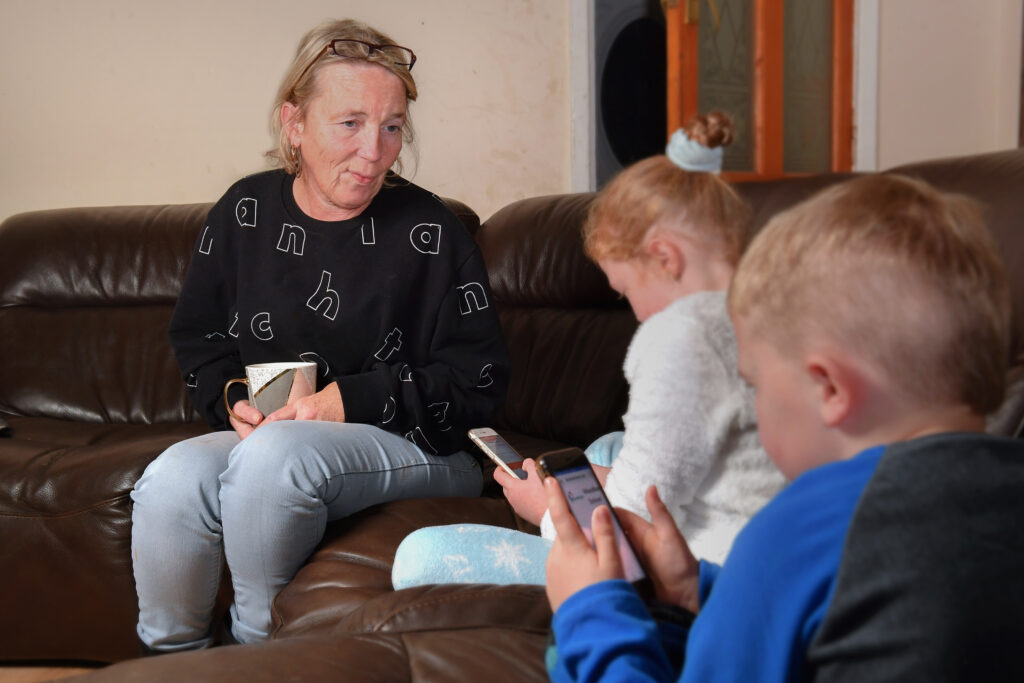In March 2020, Tina Taylor was at Leeds Gypsy and Traveller Exchange – a thriving community hub in West Yorkshire – volunteering as a suicide awareness officer. People around her were starting to talk about COVID-19, discussing new reports that warned schools could soon close their doors and move to online learning at home.
Digital poverty
As a 45-year-old single mum of eight, with three children in primary or secondary school, Tina worried what these closures might mean for her children. The Bradford-based family did not have the necessary internet access or devices needed for home-schooling.
But at the community hub, Tina saw information from 100% Digital Leeds, a council-led team working to make Leeds a digitally inclusive city for everyone. It is one of 250 community-based teams or organisations receiving second-hand, refurbished smart phones from a programme called Community Calling, run by environmental campaigning charity, Hubbub.
Tina contacted 100% Digital Leeds and shared her concerns. Shortly afterwards, her family received two smartphones from Community Calling, and a separate laptop, so her under-13s could access online lessons and home-learning packs. Like all handsets donated through the scheme, Tina’s phones came loaded with enough data from O2 to cover the first year of internet access.

“It was a Godsend,” explains Tina, “the children could access their schoolwork and find things out for their projects. Not only that, but they could stay in touch with their friends, which was so important when everyone was stuck inside.
“Out of lockdown, the phones are still used and help us to stay on top of things. As a big family, we share calendars so we can keep track of appointments, important dates… and each other!”
Much-needed support
Tina’s family is one of more than 6,000 recipients of Community Calling devices so far. The programme launched in 2020 with the aim of securing and distributing 10,000 unwanted and unused business or personal smart phones to digitally isolated people.
Rehoming phones has a dual social and environmental benefit, giving people like Tina’s family much needed access to technology while offsetting over 300 tonnes of CO2 and saving 30 million litres of water (according to Reconome and Water Calculator respectively).
For Hubbub, working in partnership is a way of life: the organisation has worked with hundreds of businesses, local authorities and community groups since it started in 2014. Its Community Calling scheme is also underpinned by successful partnership working, from discovering troves of unwanted phones in businesses, to getting data-ready devices to the people that need them through local community groups.
Hubbub joined the BOOST in 2021, a six-month programme delivered by The Young Foundation, that helps organisations scale-up through making connections and forging partnerships. It joined with the aim of looking for more partnership opportunities, support to reach its existing 10,000 phones target, and help to build a longer term, sustainable phone donation scheme.
Hubbub’s Community Calling lead, Emily Watson, explains, “It is really important for us to secure a logistics partner, as shipping thousands of phones is not an insignificant cost for us. BOOST has introduced us to potential collaborators, and that is something we’re hoping to finalise soon. We have also been introduced to EY, which is helping us connect with businesses which have phones to donate.
‘The tip of the iceberg’
“Working with the BOOST team, we’ve been thinking about the additional funding that we will need to sustain the programme beyond next year – and beyond our initial target. Advice from other cohort members has also been really helpful when exploring alternative funding streams, such as crowdfunding.”
As Emily explains “matching 10,000 people with phones is just the tip of the iceberg. There are seven million people in the UK who are digitally isolated and more than 28 million surplus phones going spare in homes and offices.
“Given the scale of demand and the number of abandoned devices, the dream would be collaboration on a much greater scale across the telecom, tech and broader business sectors. Just imagine the incredible social and environmental impact if that happened.”
Hubbub stills needs companies to step-up and open their vaults of old phones. They are 4,000 phones shy of the 10,000 target. With a highly secure phone scrubbing service that can be done on-site at the donor’s office, they are keen to hear from potential donors now.
BOOST 2021 has been part of the government-backed Inclusive Economy Partnership, which aimed to improve the lives of people across the UK, through partnerships. The Young Foundation continues to explore new forms of partnerships as part of legacy activities for BOOST, focussed on cross-organisational partnerships. Please email iep@youngfoundation.org for more information.
